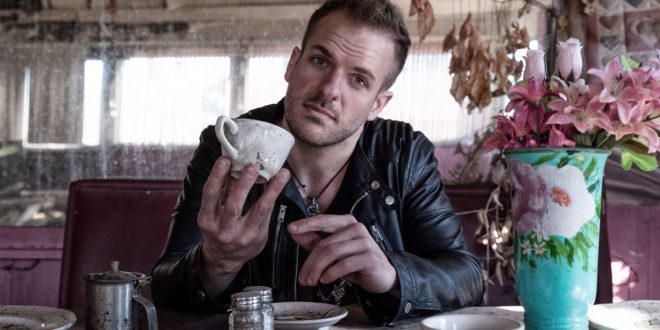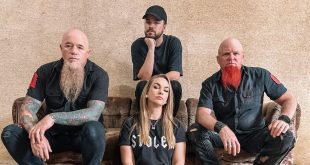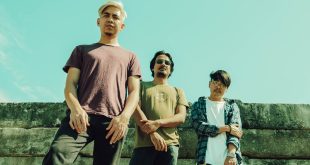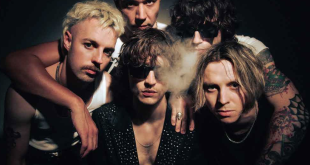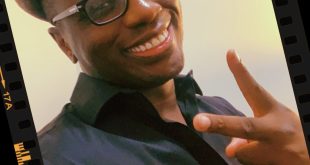Luke Justin Roberts is an emerging Maryland-based singer/songwriter. Having been raised in an evangelical Christian environment, his formative musical exposure came to include contemporary Christian and worship music, and to a larger extent, secular alternative and classic rock artists. Under the name LJR, all of those influences factor into Roberts’ punchy, yet palatable sound, initially catalyzed on YouTube through several well-received covers. He currently releases original songs on a monthly basis, the latest being “More Time.” It is the second single on his upcoming full-length debut album, When the Sky Began to Fall, which is slated for 2022.
I caught up with Luke to discuss how he first gravitated to music in his youth, how leaving evangelism shaped his outlook as an adult, managing the internet aspect of his music career, as well as what to expect in his present and upcoming material.
When you were five years old, that marked your first big exposure to music. It involved seeing your father perform, and your brother was also learning guitar. Based on what they were doing, you picked up drums. Was your family equally encouraging you in your own endeavors?
I’d say they were encouraging when it came to my pursuing music for the interest of it, but it took a lot of convincing for them to get on board with me pursuing it as a career. My dad was excited that I was learning drums. My older brother was learning guitar, and my younger brother was learning bass as well, so we had a family band which was a lot of fun, and my parents liked that a lot. It took a while before they’d support me doing this as a full-time thing, but eventually, they did.
From there, you went on to sing and play piano. As you got older, and were discovering your musical identity, which bands and artists did you become influenced by?
Around high school, which was when I dove the deepest into music, I started listening to a lot of Coldplay, Hillsong United, and Peter Gabriel. The Christian music was from being brought up in that evangelical world, but I also really liked the Back in the Highlife album by Steve Winwood – the song “Higher Love” specifically, as far as the percussive aspect. Both he and Peter Gabriel influenced my vocal style – Peter Gabriel especially.
That’s cool, man; it’s a good combination. With Christian music, there’s a lot of gems, like Jars of Clay, Jacob’s Trouble, and mid-90s era DC Talk. Speaking of your Christian upbringing, you originally attended an evangelist megachurch, is that right?
Yeah. I grew up in what was at first a relatively small, non-denominational church here in Maryland. I can remember that when I started going, it seated around 400 people, and now, it has anywhere between three to five thousand. It was a huge property – one of those gigantic auditoriums – and held around three or four weekend services. I think now they do Saturday service and also have a bunch of youth services.
With the Christian music stuff, it’s interesting. I guess you have a bit of a background with it, too. Yeah, a lot of [secular music listeners] don’t know about Jars of Clay or DC Talk. Newsboys was a band I’d listened to also, with those classics like “Step Up to the Microphone” and “Breakfast”. There’s definitely some influence there. I can remember trying to sound a bit like Third Day, and also liked what Lifehouse and Switchfoot were doing. There’s a lot of mainstream Christian music that I didn’t really get on board with, like Chris Tomlin, but I thought Hillsong seemed more genuine and relatable as far as worship music. I still feel like I’ve borrowed some textures from parts of Hillsong songs. Eventually, I moved away from it, because it just seemed like that scene was a bit behind.
I understand – like belated adoptions of contemporary sounds.
Yeah. They’d seem hip and new, but mainly because it felt like they were doing the Christian versions of pop songs.
They followed that model, right?
Yeah, exactly (laughs), and there’s still a lot of that going on. But I respect a lot of what Hillsong is doing, and how they incorporate alternative, electronic, and pop sounds.
In keeping with how you felt in the evangelical environment, was there a genuine sense of community and belonging? Once you were thinking of moving beyond it, at what point did you follow through?
So, when I was in it, at first, I felt like it provided me an identity, and the music we played was something I needed. You know, when you’re a kid, you’re going through a lot of stuff coming to terms with who you are, and learning a lot about navigating relationships. Through all that pain, it was a foundation of something to hold onto. I’d think, “This is amazing; these people are awesome; I wouldn’t trade this for anything!”
But there were a few moments where I couldn’t really see the full picture of what was going on – as if to say, “Maybe this community isn’t all that great.” I can think of two in particular. The first was when I was in college. I was the vice president and worship leader in Campus Crusade for Christ at UNBC, trying to share the gospel with people all around campus – even on Panama City Beach, during spring break, where people were all drinking and partying (laughs).
Oh, man. Completely different crowd!
Yeah! I was in my junior year and had spent the first two years dedicating all my extra time to this organization. I was there for everything. You lead a small group, but you also want to hang out, socialize, and make friends. It was 20 hours a week, if not more. There was a moment where I was like, “Wow, I almost failed my first wave of exams in junior year doing [Campus Crusade],” so, I had to step back, and spent the last of that semester trying to pull my grades back up. Eventually, I got straight As and one B, and was really proud of that. But once I went back to the organization at the end of the semester, it was almost like nobody remembered who I was. After two years, it seemed like nobody really cared that I’d been gone. I’d try catching up with people I hadn’t seen in a long time, and they’d just treat me like whatever. It was really weird. I felt like there’d at least be some kind of coming home thing, or that I mattered to others.
It must have felt very indifferent and isolating.
Yeah, I mean, there were relationships I had that I felt were deep and meaningful, but to them, they didn’t seem significant at all, because these people didn’t miss me (laughs)! It’s like, if you don’t miss somebody or at least check on them, then it’s not that deep of a relationship. So, that was my first notice of, “Okay, something’s really weird here.” Over time, there were other things that led me down the path of wondering, “Is this really true?” Eventually, you think, “Well, my life needs to line up in a way that what I’m being told is real,” and not just understanding from a logical standpoint that there are some strong arguments to this. I’d relied on apologetics – defending my beliefs – for so long, but then I thought that I didn’t need God to be real in a practical way.
In other words, you started processing your faith internally, and no longer felt the need to outwardly express it.
Right! What I realized was that there wasn’t a true foundation for my experience; I believed it just because I was taught it growing up. There were reasons to believe, and I was under the notion that what I was reading was accurate, but then, I started to think, “Why is this true? None of these things seem to hold any bearing in real life.” Eventually, I started reinterpreting things, and that became my way of holding on.
In the other instance that happened to me, I was at a really low point. Many Christians might talk about a sequence of events that was too much to consider coincidence, where they’d say, “Oh, that was definitely God,” and I considered that, during this valley of the shadow of death, I’d also be rewarded for my faith. The moment when it was all supposed to come together, I had this sinking feeling that if this didn’t work, something inside of me was going to break, and…it didn’t work. At that point, I said, “Okay, I need to be able to reevaluate this situation.” I ended up leaving the church that I was a part of, and just like what happened in college, nobody seemed to care. There were two friends I’d made at the church that had reached out, and that I’d made every effort to keep in my life, but based on the few times we’d hang out together after I left, they stopped trying.
Was the contrast between you guys more apparent at this point?
Yeah. I think if it wasn’t for our faith in God, there’s a chance we wouldn’t have been friends to start with.
So, you recognized that you didn’t have any shared interests alongside your faith, like music?
Yeah, and it was one of those things where, being in an evangelical environment, the only thing that mattered above all else was your faith in God. Anything related to shared interests had no inherent value in the context of serving God, and that’s literally it. I understand that people have many different experiences, but in the type of Christianity I was raised in, if you took what the Bible says verbatim, it’s really difficult to put in the context of everyday life. You perceived others as souls needing to be saved, who, if you don’t tell them all about Jesus Christ, will be sent to hell. It was very manipulative, even though I didn’t feel like it was at the time. It was just amazing how powerful, and, simultaneously, how unhealthy it was.
Ultimately, your move was about starting on a clean slate, and regardless what you take away from those experiences, you move forward. As far as your being an active musician, when did that pursuit take shape?
Well, at first, I was part of the worship band. That was my main thing for a while. There was also the band I had with my brothers, but to me, at least at the time, I felt that it didn’t carry the same weight as playing music while gathering people together to save their souls. I did stay committed to the family band, though, even after leaving the church, but it ended up not working out. I also tried something with my older brother – just the two of us – but that didn’t work out either. We’d stayed in contact, but it was difficult for us to actively work on something like that together. At this point, I’ve been doing solo stuff for four years, and that’s also when I decided on doing it full-time.
Let’s talk more about your musical background, in terms of the opportunities that came your way. You opened for Matt Nathanson, as well as the band A Great Big World. How did it feel to be in that situation?
With that, I got pretty lucky there. I was playing some shows with Cecilia Grace as the drummer in her band, and she got us to open for them when we played in Baltimore. It actually wasn’t a case of me landing that opportunity through my music; it was through Cecilia and some of her friends. But it was really cool, and I’m hoping for something like that in the future. I’ve been working on building my brand online, and haven’t played a live show in quite a while. In this day and age, it’s become much more difficult to build a fanbase solely through playing live. By building something online first, you figure out where your fans are, and specifically target those cities to go and tour. Then, you can reach out to the fans you have in those cities, and get them to come to see you. That way, you’re able to play on a consistent basis and make enough money.
In managing the internet side of your career, at what point did you start to see serious growth?
I think by November or December 2019, that’s when it started to jump. I took an online course called The Modern Musician, which teaches you all about how to market and advertise your music. That’s when things started to change, because I actually started developing a fanbase around my original music. They wanted to stay connected on my social media pages, buy merch, and tickets to livestream shows, and they would also ask me about playing in person. I started making consistent money every month, and it’s directly related to my personal brand through working with other people.
Usually, you see a lot of scammy courses made by fake gurus, that are overpriced and full of information you could find either freely or cheaply online, but it seems like this one gave you a lot of value!
Yeah, man, I’d highly recommend it. They actually asked me to come on staff, so now I work with them as a coach and talent scout. It’s a great program. It’s definitely expensive, though, and will run you around $5,000, but it’s worth it. I’ve made way more than that by implementing the program, so I’m a big advocate of it. There’s a lot of other ones out there that I’ve gotten value from. Indieprenuer was the first one I’d gotten, then I learned about Spotify Growth Engine by John Gold. But The Modern Musician is the most comprehensive, especially with their one-on-one coaching. It’s also fully automated, so once it’s set up, it just runs itself. It regularly introduces your music to new fans, and the coaches help you iterate and improve your strategy – everything from marketing and figuring out how to tell your story, to how to set up your website and run merch offers, to how to set up live shows for set prices.
It’s really made a difference for me. I moved into my current apartment recently, and one of my fans actually bought me a couch – they gave me a check for $400. The same goes for kitchenware and other stuff around my house.
When you start out as a musician, it’s not even that people are critical of your music, they just don’t care. But it goes to show that once you’re in front of the right people, that’s what matters.
Yeah, and one thing I love about the program is that it gets you in front of the exact, right people. I find that people hate on those types of courses, because either they’re not getting the results, or they find them difficult to understand, when really, it’s all about the effort and the implementation.
It’s amazing that, upon utilizing these things, you’ve seen great success! Going forward to your recent stuff, you’ve released the single, “More Time.” With a song like this, which deals with the heaviness of a relationship, similar to the stuff we’ve talked about, did you write this song as the event is happening, or in retrospect?
These days, since I’ve grown to be more in touch with what I’m feeling as it’s happening, I think I’m more inclined to write a song within that particular moment. But there was actually a long time when I wasn’t aware of what I was feeling inside, and definitely not in a way that I could communicate that. There’d be this gap between what I was experiencing and the emotions that would build up, and that would cause me to write something, and oftentimes, I wasn’t even aware of what I was writing about. One example of this is on the track “Save,” which is directly about my relationship with the church. I’m feeling this deep pain, so I compose the instrumentation, but when it comes to the lyrics, I was like, “Is this how I really feel?” I was saying these words that were coming out of my mouth, but I didn’t actively and consciously identify with them. I was very tempted to judge what I was writing, thinking, “Am I allowed to feel this? Am I supposed to feel this? Is this true for me at all?” Yet, it was coming out. Thankfully, I didn’t really edit it, because a number of years later, when I went back to putting out original content, that song described exactly what was going on with me on an internal level – my experience leaving church, and with God. I didn’t realize at the time that I was that disconnected, but once I started processing through my pain, and giving qualitative definitions to these experiences, I knew that it was going on at a subconscious level, and I was able to express that in a very visceral way. Since then, there’s a much smaller gap between when I experience something and when I find it necessary to express how I feel about it.
Your plan has been to gradually release material from your upcoming album, When the Sky Began to Fall. Were you surprised by how naturally the album flowed together?
Yeah! While writing the songs for the album, I wanted to make them as if they’re part of a live show – how I would structure a concert. You start out with the heavy-hitting songs, dip down a little in the middle, and then come back with a big bang at the end. As I was processing the song’s content, as well as the journey I’ve been through these last 10 years of my life, I realize that I’d structured the album perfectly according to how things went, and unintentionally, at that. I’m being a little bit vague because I’m hoping the listener could figure out what the overarching narrative is. It won’t just be 12 songs, but 12 videos, that portray this theme symbolically.
That’s cool that you’re accompanying the songs with videos. I’ve known of a couple of artists who have done that, but you’re really going for it!
Yeah, I’m trying it, and it gets me pumped. The first track, “I Can’t Say,” took so much time and effort, especially for something that needed a message to fit the narrative, and was also represented through visual effects. I’ve never done something like that before. The process for just that one song took 150 hours total, and I thought by then, I’d be completely and creatively exhausted to do videos for more songs, but I actually ended up feeling more energized and excited after doing that, so that was really encouraging.
When it comes to the production of your music, it’s really well done, based on what I’d heard in your latest single and your previous covers album. How do you usually go about that process?
I’ll usually come up with the overall feel, or tune, of the song, and then write something on piano. Then once I find the arrangement that I like, I’ll start singing, come up with the lyrics, and express what I’m trying to say. From there, I’ll add other things, like bass, drums, and guitar – all for the general idea. I’ll then go to my friends, who are actually good at those things, and be like, “Hey, can you play these parts and make them not sound bad?” (laughs)! After that, I’ll have my buddy Felix do the mixing. He’s super talented at that. I can try to do it myself, but I’d just be sacrificing a lot in terms of the overall integrity. I have good ideas, and can play drums and keys, but I’ll feel better handing the other stuff over to those who know what they’re doing, unless it’s ridiculously simple.
Either way, it’s a good product. You’re not afraid of putting crunchy guitars at the forefront, and that’s important.
Ahh, dude, yeah, man! A lot of the lead guitar stuff I listened to growing up was from guys like Joe Satriani and Steve Vai, and my older brother’s an incredible guitarist, so I’d pick up stuff from him, too. Then, I’ll combine it with modern solos that feature less notes – something more pure and intentional.
Like a guitar solo that actually makes sense.
Yeah, exactly! There’s this song from The 1975 called “The Sound” that I just love, which has a killer guitar solo, and that’s influenced the way I structure my solos now. Depending on the song, I’d write out the solo, and I’d work with my older brother until we can get the right sound for it.
Considering your three-plus-year journey as a solo act, and your decade-long journey overall, what have you learned about yourself, as a musician, and as a person?
One of the things I’ve learned is being comfortable with not knowing what’s going to happen, and not needing to be in control of my environment as much as I used to. I’ve learned to be more open creatively, like, “How can I be more honest with my whole heart,” and ascribe more value to my own journey, asserting what it is that I want, and what I think matters most, without a sense of shame or a need for other people to validate that.
I’ve also learned more about what’s possible with my voice. I used to not be able to hit notes that were (sings in emphatic high pitch) “way up here,” and as it turns out, people who have a low baritone voice like me totally can hit them with their full voice. In my song “Need A Little Lovin’,” which comes out next month, I go harder into that style, and it’s been one of the more rewarding things, because I didn’t think it would be possible. I’m not an expert vocalist by any means, but I’ve learn to do that, and actually enjoy the tone that I create. My voice used to have a harshness to it, but I’ve learned to harness the natural grit that it has now.
That’s awesome how you’re able to notice your improvements from both a musical and personable standpoint! Lastly, anything you’d like to say to your fans?
I want to say thanks so much for being a part of my journey. It’s really hard to believe in yourself as an artist sometimes and put your vulnerabilities out there for the universe to acknowledge. So, when people like you stream my songs, buy my merch, are there for the times that are great or not as good, and understand and recognize my potential, it’s massively encouraging and keeps me going. Major shoutouts to The Syndicate, which is the Facebook fan group out there, to everyone who supported me on my Patreon and crowdfunding campaigns, and everyone who supports me in general!
LJR Socials:
 Music Existence Because of Music, We Exist
Music Existence Because of Music, We Exist
